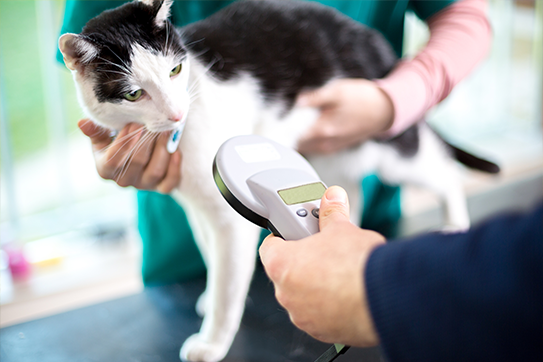Our furry feline pets are amongst our absolute favourites, and there’s good news for cat owners - from 13 March the UK Government has made it mandatory to have all cats microchipped in a move to help protect the animals more effectively.
In much the same way that dog microchipping was introduced in 2016, cat owners will need to implant their pets before they reach the age of 20 weeks, making it much easier for lost or stray pet cats to be reunited with their owners and returned home safely.
Cats are one of the UK’s most popular pets - in fact, there are over 9-million cats in England alone, with an estimated 2.3-million as yet unchipped, making them vulnerable to theft or getting lost.
How to microchip your cat
The microchip is a small device, about the size of a grain of rice, that is implanted under the skin of your pet, usually between the shoulder blades.
Microchipping is a safe and painless procedure that can be done by a qualified professional, such as a vet or a trained animal welfare worker. The procedure takes only a few minutes and can be done during a regular vet visit or at a microchipping clinic.
There are many places in the UK where owners can take their pets to get them microchipped. Vets, animal welfare organisations, and even some pet stores offer microchipping services.
The cost of microchipping can vary depending on where you go, but it typically ranges from around £10 to £30 per pet.
What happens once your cat is microchipped?
When your pet is microchipped, the unique identifier on their chip, which can be read by a special scanner, is linked to your address and contact details, making this a simple and effective way to identify your pet if they become lost or stolen, and for authorities to quickly and easily reunite you with your furry friend.
What about other pets?
Of course, cats aren't the only pets that need to be microchipped. Dogs in the UK over the age of 8 weeks must be microchipped, and the owner's details must be registered with an approved database.
Similarly, all horses, ponies and donkeys in the UK must be microchipped by law. Horses have a ‘horse passport’ which contains a full history of the animal, including its stabling, vaccinations, medical history and more.
It is now possible, and mandatory, to link a horse passport with the microchip to help owners and authorities keep track of horses.
How else can microchipping help me and my pet?
The benefits of microchipping are numerous. Apart from greatly increasing the chances of your pet being returned to you if they become lost or stolen, microchipping also helps to deter pet theft, as would-be thieves know that microchipped animals are far easier to identify.
Additionally, some insurance companies offer discounts on pet insurance premiums for pets that have been microchipped.
Just a quick reminder!
The new UK legislation on cat microchipping means all owners must have their cat microchipped by 10 June 2024. If you miss the deadline you may face a fine, so please remember to get your precious pet chipped as soon as you can!





